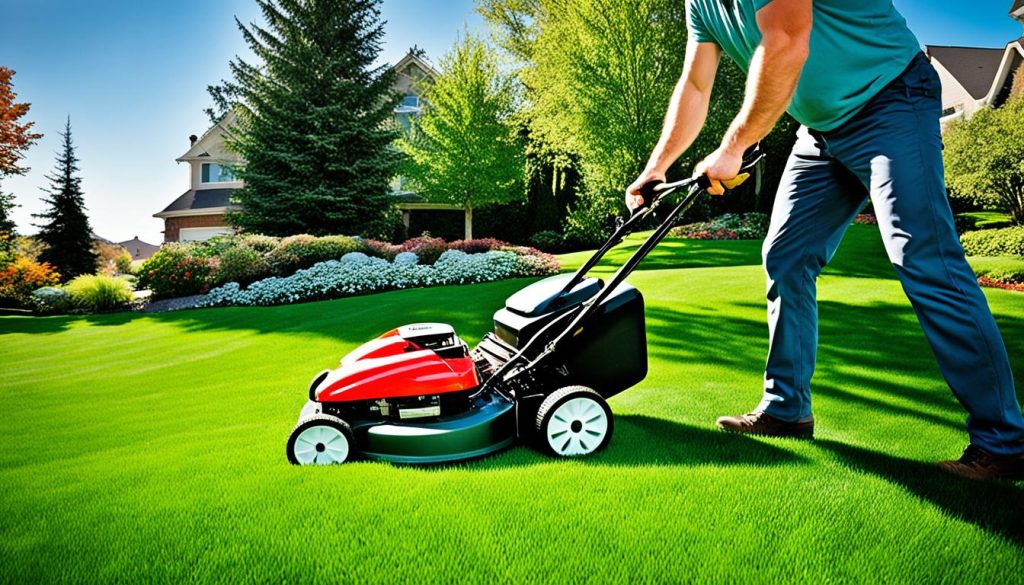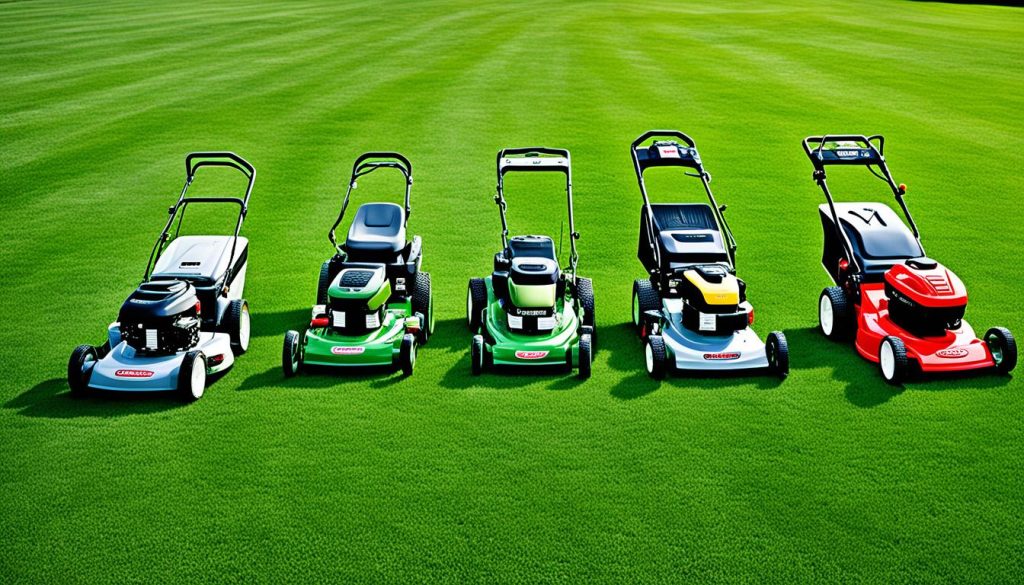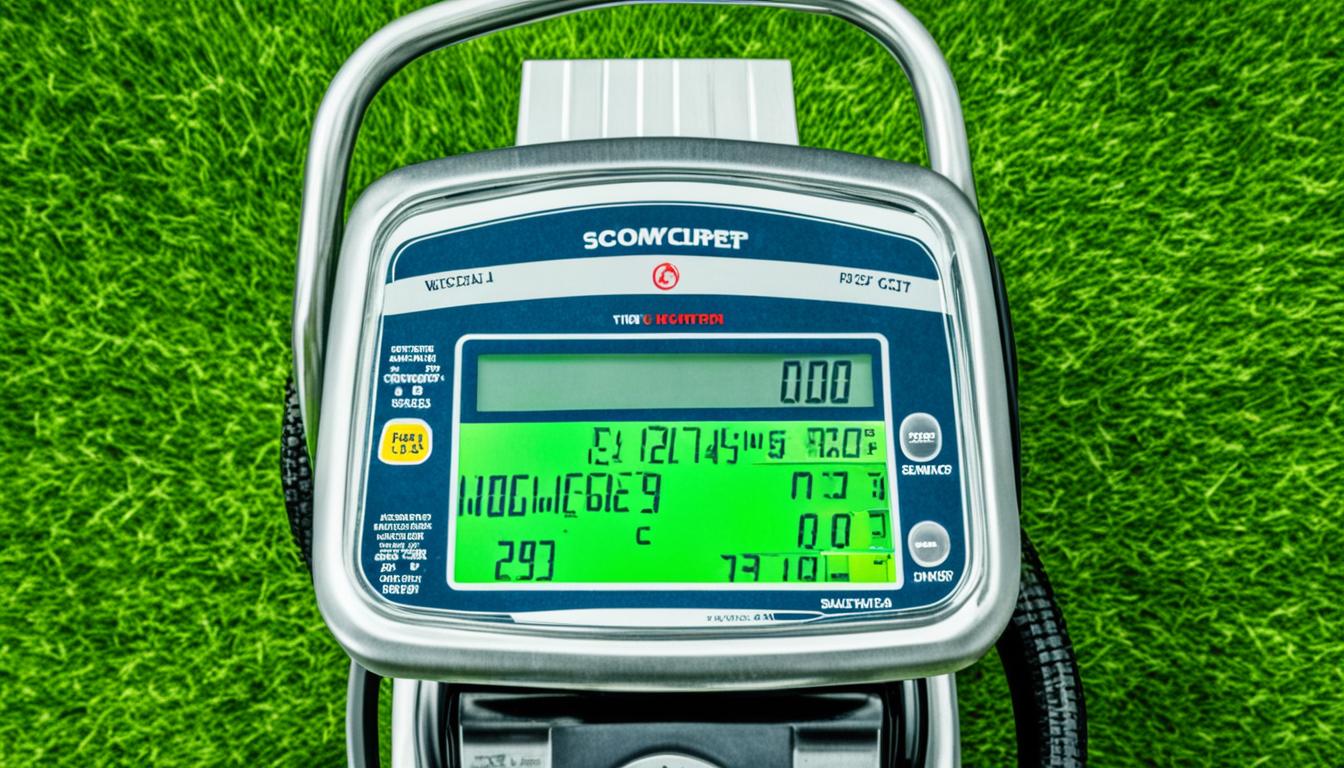Have you ever wondered how much your lawn mower weighs and whether it makes a difference? It turns out that the weight of a lawn mower can have a significant impact on the health and appearance of your lawn. But just how much does a lawn mower weigh, and what are the implications? Let’s explore the weight range of different lawn mower models and discover the tips for choosing the right mower for your lawn’s needs.
Key Takeaways:
- The weight of a lawn mower affects the health of your lawn, as heavy mowers can compact the soil and damage grass blades.
- Lighter mowers are easier to maneuver, while heavier mowers provide a more even cut and can compact the soil.
- Push mowers usually weigh between 30 and 80 pounds, while riding mowers can weigh up to 800 pounds or more.
- Consider the size of your lawn and the type of terrain when choosing the right weight mower for optimal performance.
- Choosing a mower with a weight capacity that you can comfortably lift and transport is essential.
The Impact of Lawn Mower Weight on Your Lawn
When it comes to mowing your lawn, the weight of your lawn mower can have a significant impact on the health and appearance of your turf. The weight of the mower affects various aspects of your lawn, including soil compaction, damage to grass blades, and overall maneuverability.
Soil compaction: Heavy lawn mowers can exert excessive pressure on the soil, leading to compaction. Compacted soil makes it challenging for grassroots to grow deep and absorb vital nutrients, resulting in thin, patchy, or yellowing grass.
Damage to grass blades: The weight of the mower can also cause damage to the delicate blades of grass. Heavy mowers can bruise and tear the grass blades, affecting their ability to photosynthesize and grow healthily.
On the other hand, lighter mowers offer several advantages. They are easier to maneuver, allowing you to navigate around obstacles with ease and mow in tight spaces more effectively. Lighter mowers are also less likely to cause damage to both the grass and the soil.
To visualize the impact of lawn mower weight on your lawn, refer to the table below:
| Lawn Mower Weight | Impact on Lawn |
|---|---|
| Heavy |
|
| Light |
|
As you can see, selecting the appropriate lawn mower weight is crucial for maintaining a healthy and vibrant lawn. Consider the unique characteristics of your lawn, such as its size and terrain, to determine the ideal mower weight that will promote optimal grass growth and minimize damage.
Choosing the Right Weight for Your Lawn
When it comes to choosing a lawn mower, it’s important to consider the weight and how it can impact the health and appearance of your lawn. Several factors, including the size of your lawn and the terrain, should influence your decision-making process.
If you have a smaller lawn, opting for a lighter mower may be ideal. Lighter mowers are easier to maneuver, allowing you to navigate around obstacles with ease. They are also less likely to cause damage to your lawn or soil, providing a safer mowing experience.
On the other hand, if you have a larger lawn, a heavier mower might be more appropriate. Larger lawns often require more cutting power, and a heavier mower can provide that extra force needed for efficient cutting. However, it’s essential to find the right balance—choosing a mower that is too heavy may result in difficulty maneuvering and potential damage to the terrain.
Consider the type of terrain on your lawn as well. If your lawn is hilly or has uneven surfaces, it may be more challenging to manage a heavier mower. In such cases, a lighter mower can make the mowing process smoother and more manageable.
Ultimately, the goal is to choose a mower that suits the specific needs of your lawn. By taking into account the size of your lawn, the terrain, and your personal preferences, you can ensure that you’re selecting the right weight mower for optimal cutting efficiency and the overall health of your lawn.
Take a look at the table below to get a better understanding of how choosing the right weight can impact your mowing experience:
| Type of Lawn | Recommended Weight |
|---|---|
| Small Lawn | Lighter weight for ease of maneuverability and minimal damage |
| Large Lawn | Heavier weight for more cutting power and efficiency |
| Hilly or Uneven Terrain | Lighter weight for easier management and navigation |
By considering these factors and selecting the appropriate weight, you can ensure a smooth mowing experience while maintaining the health and aesthetic appeal of your lawn.
Average Weight of Different Lawn Mower Models
When considering the weight of a lawn mower, it’s essential to understand the average weights of various models. This knowledge can help you choose the right mower for your specific needs and lawn characteristics.
Push mowers: Push mowers, also known as walk-behind mowers, are generally lighter and more maneuverable. On average, push mowers weigh between 30 and 80 pounds. These lightweight lawn mowers are suitable for small to medium-sized lawns.
Riding mowers: Riding mowers, on the other hand, are designed for larger lawns and offer the convenience of sitting and steering. These heavy-duty lawn mowers can weigh up to 800 pounds or even more. Their weight is attributed to the larger engines, cutting decks, and additional features they possess.
To help you visualize the average weights of different lawn mower models, here is a table showcasing approximate weight ranges:
| Lawn Mower Type | Average Weight Range (pounds) |
|---|---|
| Push Mowers | 30-80 |
| Riding Mowers | 800+ |
Remember, choosing a lawn mower with the appropriate weight is crucial. It ensures that you can effectively maneuver the mower while considering the size and characteristics of your lawn.
Benefits of Using a Lighter Lawn Mower
Using a lighter lawn mower can offer numerous advantages for maintaining a healthy and vibrant lawn. Let’s explore the key benefits:
1. Reduced Pressure on Grass Blades
A lighter lawn mower exerts less pressure on the grass blades compared to heavier models. This reduced pressure helps prevent damage to the grass blades, such as bruising and tearing, resulting in a healthier lawn with improved growth and appearance.
2. Easier Maneuverability
Lighter lawn mowers are easier to maneuver, making them ideal for navigating through obstacles or tight spaces in your yard. With improved maneuverability, you can effortlessly mow around trees, flower beds, and other delicate areas without causing any unintended damage.
3. Time-saving
The lighter weight of these mowers enables you to cover larger areas of your lawn more quickly. With reduced resistance, you can effortlessly push or guide the mower, saving you valuable time and energy during your mowing routine.
4. Avoiding Damage to the Lawn
A lighter lawn mower reduces the risk of inadvertently running over objects on the lawn, such as toys, rocks, or sprinkler heads. By avoiding potential obstacles, you can avoid damaging your mower’s blades and prevent any potential harm to your lawn.
To better understand the benefits of using a lighter lawn mower, refer to the table below, which highlights the key advantages:
| Benefits | Explanation |
|---|---|
| Reduced Pressure on Grass Blades | Lighter mowers exert less pressure on the grass blades, reducing the risk of damage and promoting healthier growth. |
| Easier Maneuverability | Lighter mowers are easier to maneuver, especially in areas with obstacles or tight spaces. |
| Time-saving | Using a lighter mower can save you time and effort while mowing, allowing you to cover larger areas quickly. |
| Avoiding Damage to the Lawn | By using a lighter lawn mower, you can avoid accidentally running over objects on the lawn and causing damage to the mower or the grass. |

Benefits of Using a Heavier Lawn Mower
While lighter mowers have their advantages, there are also benefits to using a heavier lawn mower in certain situations. The additional weight of a heavy-duty mower can have several positive effects on your lawn’s health and appearance.
- Compacting Soil: One of the benefits of a heavier lawn mower is its ability to compact the soil. As the mower passes over the grass, the weight presses the soil particles closer together, creating a more compacted surface. This can be beneficial for certain types of grass that thrive in denser soil conditions.
- More Even Cut: A heavier mower can provide a more even cut across your entire lawn. The weight and pressure applied by the mower can help push down uneven patches of grass, resulting in a smoother and more uniform appearance. It helps ensure that all areas of the lawn are cut to the desired height.
- Cutting Efficiency: The weight of a heavier mower can contribute to its cutting efficiency. With more weight behind each pass, the mower can effectively cut through thicker or denser grass, reducing the need for multiple passes over the same area. This can save you time and effort while achieving a well-maintained lawn.
However, it is important to find the right balance when choosing a heavier mower. A mower that is too heavy can cause damage to the soil or grass if not properly managed. Consider the specific needs of your lawn and terrain before deciding on the weight of your mower.
Comparing the Benefits of Lighter and Heavier Lawn Mowers
| Lighter Lawn Mowers | Heavier Lawn Mowers | |
|---|---|---|
| Compacting Soil | Not as effective | Effective for certain grass types |
| Even Cut | May struggle with uneven patches | Can push down uneven patches for a smoother cut |
| Cutting Efficiency | Efficient for regular grass | Efficient for thicker or denser grass |
| Maneuverability | Easy to maneuver | May require more effort to maneuver |
| Damage Potential | Less potential for damage | Potential for damage if too heavy |
Other Factors for a Healthy Lawn
While the weight of your lawn mower is important, there are other factors to consider for a healthy lawn. Adequate irrigation, fertilization, mowing techniques, and choosing the right grass all play crucial roles in maintaining a lush and vibrant lawn.
Irrigation
Proper irrigation is essential for the health of your lawn. Ensure that your lawn receives sufficient water to promote deep root growth, but be careful not to overwater, as this can lead to shallow root systems and increased vulnerability to diseases and pests.
Fertilization
Regular fertilization is necessary to provide essential nutrients to your lawn. Use a high-quality fertilizer and follow the recommended application rates and schedules. This will help promote healthy growth, improve color, and strengthen your lawn’s resistance to stress.
Mowing Techniques
Implementing proper mowing techniques can contribute to the overall health and appearance of your lawn. Avoid cutting your grass too short, as this can weaken the grass and make it more susceptible to weeds and diseases. Additionally, regularly sharpening your mower blades and alternating mowing patterns can help achieve a clean and even cut.
Choosing the Right Grass
Selecting the right type of grass for your climate and soil conditions is essential. There are various grass varieties available, each with its own specific requirements and growth habits. Research and choose a grass type that is well-suited to your region and the specific conditions of your lawn.
By considering these other factors along with the weight of your lawn mower, you can ensure the long-term health and beauty of your lawn. Implement proper irrigation and fertilization practices, use appropriate mowing techniques, and choose the right grass variety to create a thriving and vibrant outdoor space.
Image:
The Significance of Riding Lawn Mower Weight
When it comes to riding lawn mowers, weight plays a significant role. The weight of a riding mower can have implications for maneuverability, transportation, and storage.
Heavier riding mowers are often considered more powerful, capable of handling tough mowing tasks with ease. However, they may prove to be harder to turn, especially when navigating tight corners or obstacles in the yard. On the other hand, lighter riding mower models offer improved maneuverability and are easier to handle, making them suitable for yards with smaller spaces or complex layouts.
Transporting a riding mower from one location to another can be a consideration for many homeowners. While lighter models can be easily loaded onto trailers or ramps, heavier mowers may require additional help or equipment to ensure safe transportation. Additionally, heavier mowers may necessitate the use of specialized trailers or vehicles that are equipped to carry the extra weight.
Storage is another factor to consider when evaluating the weight of a riding mower. Heavier mowers may pose challenges when it comes to lifting and moving them, especially if storage areas require multiple steps or involve narrow passageways. Lighter models, on the other hand, offer greater convenience in terms of storage, as they are typically easier to lift and maneuver when it’s time to put them away.
Ultimately, the significance of riding lawn mower weight lies in its impact on maneuverability, transportation, and storage. Homeowners should carefully consider their specific needs and yard characteristics when choosing a riding mower, taking into account the weight and its potential implications.
Average Weight of Different Types of Mowers
When it comes to choosing a lawn mower, weight is an important factor to consider. The average weight of different types of mowers can vary significantly, so understanding these variations can help you make an informed decision. Here, we’ll explore the average weights of various types of mowers to give you a better idea of what to expect:
Push Reel Mowers
Push reel mowers are the lightest option, weighing between 20 and 34 pounds. These mowers are manually powered and do not require fuel or electricity. They are an environmentally friendly option for smaller lawns.
Corded Electric Push Mowers
Corded electric push mowers weigh between 20 and 40 pounds on average. These mowers are powered by electricity and require a cord for operation. They are suitable for small to medium-sized lawns.
Cordless Battery-Powered Push Mowers
Cordless battery-powered push mowers range from 30 to 50 pounds in weight. These mowers offer the convenience of cordless operation, powered by rechargeable batteries. They are ideal for small to medium-sized lawns.
Gas-Powered Push Mowers
Gas-powered push mowers are heavier, weighing between 60 and 80 pounds. These mowers are powered by gasoline engines and offer more cutting power. They are suitable for medium to large-sized lawns.
Riding Mowers and Lawn Tractors
Riding mowers and lawn tractors are much heavier, weighing around 400 to 500 pounds. These mowers are designed for larger lawns and feature a seat for the operator. They are powered by gasoline engines and offer enhanced cutting efficiency.
Zero-Turn Mowers
Zero-turn mowers are the heaviest of all, weighing from 600 to 900 pounds or more. These powerful mowers feature a turning radius of zero degrees, allowing for precise maneuverability. They are typically used for large lawns or commercial applications.

Understanding the average weight of different types of mowers can help you determine which one is most suitable for your lawn size and mowing needs. Keep in mind that the weight of a mower can impact its maneuverability and transportation, so choose accordingly to ensure ease of use.
Factors Affecting Lawn Mower Weight
When it comes to the weight of a lawn mower, several factors can influence its overall mass. These factors include:
- Type of Mower: The type of mower you choose, whether it’s a push reel, corded electric, cordless battery-powered, gas-powered, riding, or zero-turn mower, can have a significant impact on its weight.
- Cutting Deck Size: The size of the cutting deck, which determines the width of grass each pass, can affect the weight of a mower. Larger cutting decks often result in heavier mowers.
- Number of Blades and Spindles: Mowers equipped with multiple blades and spindles may weigh more due to the additional components required for efficient cutting.
- Material of the Outer Shell: The material used for the outer shell of a mower can contribute to its weight. Mowers with more durable and heavy-duty shells may be heavier.
- Engine Size and Capacity: The size and capacity of the engine also play a role in determining the weight of a mower. Engines with higher power outputs or larger displacements tend to be heavier.
- Type of Wheels: The type of wheels used on a mower can affect its weight. Mowers with larger, sturdier wheels, such as pneumatic or solid rubber, may be heavier.
By considering these factors, you can better understand why different lawn mower models vary in weight. It’s essential to select a mower that aligns with your specific needs, taking into account factors such as your lawn size, terrain, and desired cutting efficiency.
To further illustrate the impact of these factors on lawn mower weight, refer to the table below:
| Type of Mower | Average Weight |
|---|---|
| Push Reel Mowers | 20-34 pounds |
| Corded Electric Push Mowers | 20-40 pounds |
| Cordless Battery-Powered Push Mowers | 30-50 pounds |
| Gas-Powered Push Mowers | 60-80 pounds |
| Riding Mowers and Lawn Tractors | 400-500 pounds |
| Zero-Turn Mowers | 600-900 pounds or more |
Conclusion
The weight of a lawn mower is a crucial consideration when selecting the right mower for your lawn. It has a significant impact on the health and appearance of your lawn, as well as the ease of maneuverability, transportation, and storage of the mower. Lighter mowers are more manageable and tend to cause less damage to the grass, while heavier mowers can provide a more even cut and help compact the soil.
To ensure optimal results, it is essential to consider the size of your lawn, the type of terrain, and your specific mowing needs. Smaller lawns may require a lighter mower, while larger lawns may benefit from a heavier mower for more efficient cutting. If your lawn has hilly or uneven terrain, a lighter mower may be easier to handle.
Choosing the right mower weight is an integral part of maintaining a healthy and attractive lawn. By carefully considering the importance of lawn mower weight and selecting the mower that aligns with your lawn’s needs, you can achieve optimal results while taking into account factors like maneuverability, cutting efficiency, and soil compaction. Take the time to research and test different mower options to find the perfect balance for your lawn maintenance routine.





